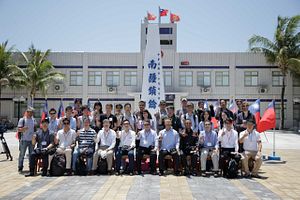Many in Taiwan termed the July 12, 2016 ruling by the Permanent Court of Arbitration in The Hague on the case of the Philippines against the People’s Republic of China “unacceptable” because in passing the Court also decided that Taiwan-occupied Itu Aba is legally not an “island” but a “rock” – and therefore does not generate an exclusive economic zone (EEZ) or continental shelf.
However, a closer look shows that the decision by the Court in the longer run will actually turn out to be good for Taiwan. Here are some of the reasons why:
First, the Court decided that there was no legal basis for China to claim historic rights to resources, in excess of the rights provided for by the UN Convention on the Law of the Sea (UNCLOS), within the sea areas falling within the “nine-dash line.” In other words, the nine-dash line has no legal standing under international law.
This is of existential importance to Taiwan, as the PRC has even included Taiwan in the area covered by the nine-dash line. The Court has thus rendered China’s claims null and void, which is beneficial for Taiwan and its quest to enhance its international standing.
There are those in Taiwan – particularly among the diehards in the right wing of the Kuomintang — who still base the Republic of China territorial claims on the nine-dash line. Suffice it to say that they do not live in reality. The noise from that side of the political spectrum should simply be disregarded.
Second, the Court only decided that Itu Aba – and all other features in the Spratlys that protrude above water at high tide — are “rocks” and are therefore not entitled to an EEZ of 200 miles. Under the decision by the Court, Taiwan retains its sovereignty over Itu Aba, including the 12 nm territorial waters zone.
Just looking at the map, one gets the idea why the Court made this decision: if Itu Aba – and any other reef or rock feature in the area – would have been declared an island, this would have led to a patchwork of overlapping EEZs with unforeseen complications for a long time to come.
As it is, the decisions leads to a number of contiguous 12 nm zones, but such a framework is much easier to handle than a patchwork of EEZs. Such a decision obviously leads to dissatisfaction among the ultra-nationalists of the Kuomintang in Taiwan, but does not entail any “loss” of sovereignty. Taiwan’s sovereignty remains undisturbed and fully intact.
What was totally unacceptable in the Court ruling was the reference to “the Taiwan authority of China.” The Presidential Office as well as the Foreign Ministry in Taipei rightly protested against this designation. If the Court had done its homework, it could have easily avoided such blatant error.
Also disturbing was the fact that the Court did not consult with Taiwan or invite it to participate in the proceedings, in spite of the fact that Taiwan is a major player in the area, controlling Itu Aba and several features in the Paracel Islands. If there is to be a solution for the complex problem in the South China Sea, it is essential that Taiwan is at the table as a full and equal claimant.
So, how does Taiwan proceed?
First, it needs to emphasize a peaceful resolution of disputes in the South China Sea through multilateral negotiations, as was done by the Presidential Office in Taipei already. Saber-rattling and sending warships to the region may boost the ego of the ultra-nationalists in Taipei, but would risk serious confrontations with other nations in the region, including China.
Second, Taiwan needs to redouble its efforts to engage other nations in the region through bilateral and multilateral contacts, so it could gain a seat at the table in future discussions on how to move forward. If Taiwan wants to achieve this, it needs to follow a reasonable and rational approach that is more in line with the ruling of the Court in The Hague than the initial reactions from Taipei.
Third, on Itu Aba itself, life should go on as before. Taiwan is best served by a low-key approach that brings Taiwan closer to its neighbors. Pragmatic and peaceful measures to enhance the benefits of Taiwan’s presence for other nations are key to acceptance by those neighbors. Good medical facilities and adequate emergency relief capabilities at Itu Aba would constitute a non-threatening way to make its presence felt in a positive manner.
And last but not least, it is essential that Taiwan avoid any impression that its position is aligned with that of the PRC. If it wants to contribute to peace and stability in the region, there needs to be an increasing distance between Taiwan’s position and the belligerent and irresponsible behavior exhibited by the leaders in Beijing.
If it wants to be accepted as a full and equal member in the international community, Taiwan will need to grow closer to like-minded friends and allies in the region – in particular the United States and Japan–and abide by international legal decisions such as the ruling of the Permanent Court of Arbitration in The Hague.
Gerrit van der Wees is a former Dutch diplomat. From 1980 through 2016 he also served as editor of Taiwan Communiqué, a publication based in Washington DC.

































